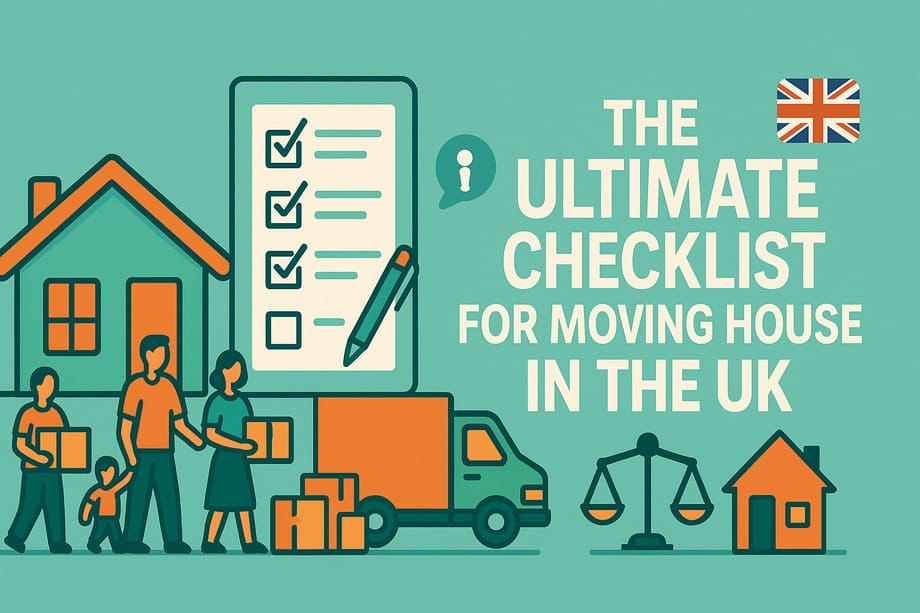The Ultimate Checklist for Moving House in the UK

Moving house is one of the biggest life events you’ll experience. It’s exciting but it can also be overwhelming. From paperwork and budgeting to redirecting post and packing up your entire home, there are dozens of details to stay on top of.
That’s why we’ve created the ultimate moving house checklist UK edition, a step-by-step guide designed to keep your move organised from start to finish. Whether you’re a first-time buyer, a renter, or moving into your dream forever home, this moving home checklist will help you tick off every task with confidence.
8 Weeks Before Moving
The earlier you start, the smoother the process will be. At eight weeks out, your main goal is to get the foundations in place.
- Confirm your moving date. If you’re renting, give the correct notice to your landlord or letting agent.
- Create a moving folder. Keep contracts, quotes, insurance, ID copies, and receipts together. Digital + paper copies work best.
- Budget for moving costs UK. Factor in removals, packing materials, cleaners, childcare, pet care, and possible storage. Costs vary widely depending on property size and distance.
- Request removal company quotes. Get at least three written quotes and ask about insurance, packing, and any additional fees.
- Declutter early. Don’t pay to move things you don’t need. Sell, donate, or recycle items before you start packing.
6 Weeks Before Moving
At six weeks out, it’s time to make key bookings and start thinking about logistics.
- Book your removals company. Confirm services (full pack, fragile-only, dismantling, reassembly, storage).
- Arrange insurance. Make sure buildings and contents insurance starts from the day you exchange or collect keys.
- Order packing supplies. Strong boxes, bubble wrap, packing paper, tape, markers, and labels. Wardrobe boxes can save time.
- Check access at both properties. Measure doorways and staircases, and arrange parking permits if required.
- Plan furniture placement. Sketch a floor plan of your new home to avoid confusion on moving day.
4 Weeks Before Moving
This is the stage where admin and address changes become essential.
- Who to notify when moving house:
- Banks and credit card companies
- HMRC and your employer
- DVLA
- Insurance providers (home, car, life)
- Local council (council tax)
- TV Licence
- GP, dentist, and schools
- Subscriptions, online accounts, and loyalty cards
- Set up broadband and utilities. Lead times can be weeks, so book early.
- Start packing non-essentials. Seasonal clothes, books, décor, and spare bedding are good to start with.
- Label boxes clearly. Include room name + contents; mark fragile or heavy boxes.
- Arrange childcare or pet care. A calmer moving day is worth it.
2 Weeks Before Moving
You’re in the final stretch. Now it’s all about confirmation and preparation.
- Confirm with your removals company. Double-check arrival time, parking, special instructions, and insurance cover.
- Book cleaners if needed. Particularly important for end-of-tenancy moves.
- Defrost and clean your freezer. Do this 24–48 hours before moving day.
- Pack your moving day essentials box. Include toiletries, chargers, kettle, mugs, tea/coffee, snacks, bedding, kids’ items, pet supplies, and basic kitchenware.
- Prepare a valuables/document bag. Carry passports, jewellery, laptops, medication, wills, and contracts with you personally.
Moving Day Checklist
On the big day, a clear moving day checklist will help keep things calm and efficient.
- Take final meter readings. Gas, electricity, and water — and photograph them for proof.
- Protect high-traffic areas. Use blankets, covers, or cardboard to protect floors and walls.
- Do a last walkthrough. Check windows, appliances, cupboards, loft, and sheds.
- Hand over keys. Leave manuals and spare keys for the new occupants if required.
- At the new property:
- Record opening meter readings
- Direct movers to the correct rooms
- Assemble beds and unpack your moving day essentials box first
After You’ve Moved
Settling in properly is just as important as the move itself.
- Register for council tax. Contact your local council with your move-in date.
- Update utilities. Send opening readings to your providers to avoid estimated bills.
- Redirect post. Use Royal Mail’s redirection service to avoid missing important letters.
- Update local services. Register with a new GP or dentist if necessary.
- Safety checks. Test smoke and CO alarms, locate the stopcock, and note boiler service dates.
- Unpack in order. Start with bedrooms and kitchen, then living spaces, then storage.
Optional: Moving Abroad or Long Distance
If you’re relocating overseas or across the country, add these to your checklist:
- Passports, visas, and customs paperwork
- Export wrapping and detailed inventory lists
- Insurance for international shipping
- Short-term essentials vs container shipment planning
- Customs and transit times — check who handles clearance on arrival
Printable Moving Home Checklist
Admin & Notifications
- Council tax, HMRC, DVLA, banks, insurers, GP/dentist, TV licence, subscriptions
Services
- Removals booked, broadband and utilities set, insurance active, parking permits arranged
Packing
- Declutter, pack early, label boxes, prepare essentials bag and valuables bag
Property
- Take meter readings, final walkthrough, leave manuals, protect floors/walls
Moving House FAQs
How far in advance should I book a removals company?
Around 4–6 weeks before your moving date, especially during peak periods.
Who to notify when moving house in the UK?
Banks, insurers, HMRC, DVLA, council tax, TV licence, GP, dentist, employer, and subscription services.
When should home insurance start?
Most homeowners begin cover on the day they exchange contracts or collect keys.
What is the average moving costs UK?
Costs depend on distance and property size. On average, moving a 3-bedroom home in the UK can range from £800 to £1,500, with extras for packing or storage.
What should be in my moving day essentials bag?
Toiletries, chargers, kettle, tea/coffee, snacks, bedding, kids’ and pets’ essentials, basic kitchenware, and important documents.
Do I need professional movers?
Not always, but a removals company can save time, reduce stress, and provide insurance cover if items are damaged.
Key Takeaways
- Start planning at least 8 weeks ahead for a stress-free move.
- Use this moving home checklist as a reference at every stage.
- Notify organisations early to avoid missed bills or penalties.
- Prepare a moving day essentials box to make the first night comfortable.
- Keep all documents, valuables, and IDs with you on moving day.
Last Updated on September 19, 2025 by James Cartwright







